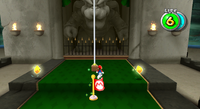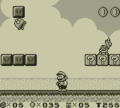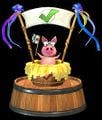Checkpoint: Difference between revisions
No edit summary |
mNo edit summary Tag: Mobile edit |
||
| (40 intermediate revisions by 19 users not shown) | |||
| Line 1: | Line 1: | ||
'''Checkpoints''' | {{about|checkpoints in general|the checkpoint from [[Yoshi's Woolly World]]|[[Checkpoint (Yoshi's Woolly World)]]|the checkpoint from [[Yoshi Topsy-Turvy]]|[[Checkpoint (Yoshi Topsy-Turvy)]]}} | ||
[[File:SMG2 Galaxy Generator Checkpoint.png|thumb|200px|A checkpoint in ''[[Super Mario Galaxy 2]]'']] | |||
'''Checkpoints''' appear in the [[Super Mario (franchise)|''Super Mario'' franchise]] as objects within a [[level]] where the player can continue from after they lose a life. If the player gets a [[Game Over]], they lose their progress in a level. Finishing a level traditionally resets checkpoints, so replaying the level starts from the beginning. | |||
In ''[[Super Mario Bros.]]'', ''[[Super Mario Bros.: The Lost Levels]]'', ''[[Super Mario Land]]'', and ''[[Super Mario Galaxy]]'', checkpoints are unmarked, with the player simply resuming from a place in the level they had passed | In ''[[Super Mario Bros.]]'', ''[[Super Mario Bros.: The Lost Levels]]'', ''[[Super Mario Land]]'', and ''[[Super Mario Galaxy]]'', checkpoints are unmarked, with the player simply resuming from a place in the level they had passed. In ''[[Super Mario Bros. 2]]'', every [[Warp Door]] serves as a checkpoint, as do the [[Mini Rocket|rocket]]s from [[World 4-1 (Super Mario Bros. 2)|World 4-1]], [[World 4-2 (Super Mario Bros. 2)|World 4-2]], and [[World 7-1 (Super Mario Bros. 2)|World 7-1]]. ''[[Super Mario Bros. 3]]'' has no checkpoints due to having shorter levels, while ''[[Super Mario 64]]'' and ''[[Super Mario Sunshine]]'' typically lack them due to most levels having a sandbox structure; however, after warping to a few exceptional areas in the former, the player returns directly to that point upon reentering the level, such as in the volcano of [[Lethal Lava Land]], and similarly for "secret" areas in the latter, an unmarked checkpoint is used instead of returning the player to [[Delfino Plaza]], as would normally happen upon life-loss. In {{a|YWW|l}} and {{a|P&YWW|l}}, while the player is in [[Easy Mode|Mellow Mode]], the exit of a boss door is an invisible checkpoint. In ''[[Super Mario Odyssey]]'', every area transition, with the exception of certain areas on the [[Dark Side]] and [[Darker Side]], is a checkpoint. Some side areas have unmarked checkpoints. | ||
''[[Super Mario World]]'' is the first game of the ''Super Mario'' franchise to have an object functioning as a checkpoint, the [[Midway Gate]]. Subsequently, other variations were used, including the [[Bell (Super Mario Land 2: 6 Golden Coins)|bell]] of ''[[Super Mario Land 2: 6 Golden Coins]]'' and the [[Checkpoint Ring|Middle Ring]] of ''[[Super Mario World 2: Yoshi's Island]]''. Since the release of ''[[New Super Mario Bros.]]'', however, ''Super Mario'' games have largely standardized on the usage of [[Checkpoint Flag]]s. | |||
==Gallery== | ==Gallery== | ||
<gallery> | <gallery> | ||
SMB2 Doors. | SMB2 Doors Sprites.png|[[Warp Door]]s from ''[[Super Mario Bros. 2]]'' | ||
MidwayGate.png| | MidwayGate.png|A [[Midway Gate]] from ''[[Super Mario World]]'' | ||
Super Mario Land 2 Tutorial Level.png|[[Bell (Super Mario Land 2: 6 Golden Coins)| | Super Mario Land 2 Tutorial Level.png|A [[Bell (Super Mario Land 2: 6 Golden Coins)|bell]] from ''[[Super Mario Land 2: 6 Golden Coins]]'' | ||
Midway Point.PNG|A [[Checkpoint Flag]] from ''[[New Super Mario Bros.]]'' | |||
CheckpointSM3DL.png| | MidwayFlag.png|An unactivated Checkpoint Flag from ''[[New Super Mario Bros. Wii]]'' | ||
CheckpointSM3DL.png|An activated Checkpoint Flag from ''[[Super Mario 3D Land]]'' | |||
Continue Point DKL unactivated.png|An unactivated [[Continue Point]] in ''[[Donkey Kong Land]]'' | |||
Continue Point DKL activated.png|An activated Continue Point in ''Donkey Kong Land'' | |||
StarBarrel DKC.png|A [[Star Barrel]] from ''[[Donkey Kong Country 2: Diddy's Kong Quest]]'' | StarBarrel DKC.png|A [[Star Barrel]] from ''[[Donkey Kong Country 2: Diddy's Kong Quest]]'' | ||
ProfChops.jpg| | ProfChops.jpg|A figurine of a [[Professor Chops]] checkpoint from ''[[Donkey Kong Country: Tropical Freeze]]'' | ||
Checkpoint Block. | WLSML3-CheckpointAni.gif|Unactivated (left) and activated (right) [[save point]]s from ''[[Wario Land: Super Mario Land 3]]'' | ||
MiddleRing SMA3.png|A [[Middle Ring]] from ''[[Super Mario Advance 3 | Checkpoint Block.png|A [[checkpoint block]] from ''[[Wario Land: Shake It!]]'' | ||
YTT-Checkpoint Sprite.png|A [[checkpoint | MiddleRing SMA3.png|A [[Checkpoint Ring|Middle Ring]] from ''[[Yoshi's Island: Super Mario Advance 3]]'' | ||
YTT-Checkpoint Sprite.png|A [[Checkpoint (Yoshi Topsy-Turvy)|checkpoint]] from ''[[Yoshi Topsy-Turvy]]'' | |||
Metro Checkpoint.jpg|A Checkpoint Flag from the [[Metro Kingdom]] in ''[[Super Mario Odyssey]]'' | |||
</gallery> | </gallery> | ||
==Names in other languages== | |||
{{foreign names | |||
|Jpn=チェックポイント<ref>{{cite|language=ja|format=PDF|publisher=Nintendo|url=www.gamingalexandria.com/fds/Famicom%20Grand%20Prix%20II%203D%20Hot%20Rally/Famicom%20Grand%20Prix%20II%203D%20Hot%20Rally%20-%20Manual.pdf|title=''Famicom Grand Prix II: 3D Hot Rally'' manual|page=21|date=1988}}</ref> | |||
|JpnR=Chekku Pointo | |||
|JpnM=Check Point | |||
}} | |||
==References== | |||
<references/> | |||
{{Checkpoints}} | {{Checkpoints}} | ||
[[Category:Checkpoints| *]] | [[Category:Checkpoints|*]] | ||
[[Category:Game mechanics]] | |||
Latest revision as of 16:52, January 9, 2025
- This article is about checkpoints in general. For the checkpoint from Yoshi's Woolly World, see Checkpoint (Yoshi's Woolly World). For the checkpoint from Yoshi Topsy-Turvy, see Checkpoint (Yoshi Topsy-Turvy).

Checkpoints appear in the Super Mario franchise as objects within a level where the player can continue from after they lose a life. If the player gets a Game Over, they lose their progress in a level. Finishing a level traditionally resets checkpoints, so replaying the level starts from the beginning.
In Super Mario Bros., Super Mario Bros.: The Lost Levels, Super Mario Land, and Super Mario Galaxy, checkpoints are unmarked, with the player simply resuming from a place in the level they had passed. In Super Mario Bros. 2, every Warp Door serves as a checkpoint, as do the rockets from World 4-1, World 4-2, and World 7-1. Super Mario Bros. 3 has no checkpoints due to having shorter levels, while Super Mario 64 and Super Mario Sunshine typically lack them due to most levels having a sandbox structure; however, after warping to a few exceptional areas in the former, the player returns directly to that point upon reentering the level, such as in the volcano of Lethal Lava Land, and similarly for "secret" areas in the latter, an unmarked checkpoint is used instead of returning the player to Delfino Plaza, as would normally happen upon life-loss. In Yoshi's Woolly World and Poochy & Yoshi's Woolly World, while the player is in Mellow Mode, the exit of a boss door is an invisible checkpoint. In Super Mario Odyssey, every area transition, with the exception of certain areas on the Dark Side and Darker Side, is a checkpoint. Some side areas have unmarked checkpoints.
Super Mario World is the first game of the Super Mario franchise to have an object functioning as a checkpoint, the Midway Gate. Subsequently, other variations were used, including the bell of Super Mario Land 2: 6 Golden Coins and the Middle Ring of Super Mario World 2: Yoshi's Island. Since the release of New Super Mario Bros., however, Super Mario games have largely standardized on the usage of Checkpoint Flags.
Gallery[edit]
A Midway Gate from Super Mario World
An unactivated Checkpoint Flag from New Super Mario Bros. Wii
An activated Checkpoint Flag from Super Mario 3D Land
An unactivated Continue Point in Donkey Kong Land
A figurine of a Professor Chops checkpoint from Donkey Kong Country: Tropical Freeze
Unactivated (left) and activated (right) save points from Wario Land: Super Mario Land 3
A checkpoint from Yoshi Topsy-Turvy
A Checkpoint Flag from the Metro Kingdom in Super Mario Odyssey
Names in other languages[edit]
| Language | Name | Meaning | Notes |
|---|---|---|---|
| Japanese | チェックポイント[1] Chekku Pointo |
Check Point |
References[edit]
- ^ 1988. Famicom Grand Prix II: 3D Hot Rally manual (PDF). Nintendo (Japanese). Page 21.












